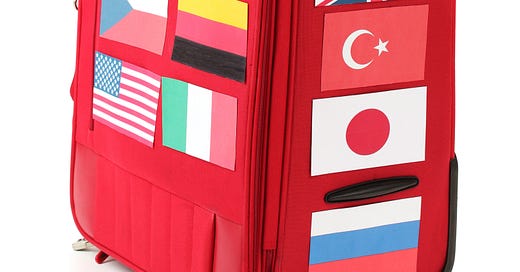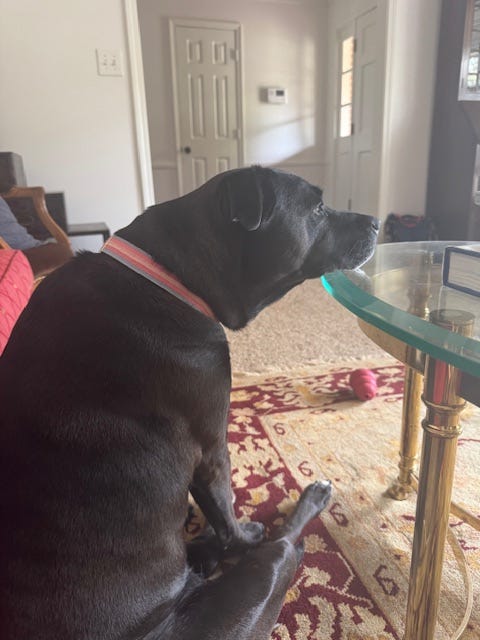I realize that I am not the only American citizen who has lived overseas as an ex-pat. I may however, be one of the few who did so in three distinctly different countries pretty much back to back for 7 years. This therefore gives me license to say a few things about the experience of language, specifically English, as viewed through a foreign lens.
Oh my that sounds high and mighty and thesis-like. That is not my intent. Let’s try that again.
I learned transactional Japanese and transactional Turkish AND transactional British English between the years of 1998 and 2004 and lived to talk about it in a funny way relative to my various and sundry adventures abroad.
There, that’s better.
The Crowe fam jumped into the deep end of the culture shock pool feet first, by moving to Hiroshima, Japan in January 1998. Luckily, the Japanese and specifically those affiliated with the car company that moved us there were hyper organized and provided me with my very own Sensei. A woman who accompanied me to places like the grocery to help translate labels and stuff, as well as helping me find an obstetrician since I arrived there four months preggers with Crowe kid #3. She also helped me learn what I came to call “transactional Japanese.” I could transact my business, in a pinch, i.e. talk to a cab driver, answer or ask simple questions at the store, tell the laundry people how to do the shirts. (see: OMG Am I a Trad Wife if you’re impressed by my many tasks).
What impressed me is how many Japanese would smile indulgently at me, pat my hand, and say in near perfect English, “It’s okay. I can speak like you,” whenever I would butcher their langauge asking the simplest of questions.
I mean, wow. Have you tried to learn English as a second (or third) language? There is zero logic to any of it, unlike Japanese, even if Japanese straight up has three entirely different alphabets (Katakana, Hiragana, Kanji).
After Japan (and an amazing childbirth experience that will be For Another Day/Substack), we spent about a year in Overland Park, Kansas, then headed overseas again because why not. We’re adventurous and our kids were small enough for us to make the decision for them.
We arrived in Istanbul, Turkey on a scorching hot August day, when pretty much everyone with sense was not in the city but somewhere on a beach on the Mediterranean or Aegean or Black Sea. Mistake Number One, but we got past that, moved into our lovely flat in a wonderful small compound that was made up of one large family, plus ours.
I was, once again, provided with an outlet to help me learn the language. Turkish, it turns out, has a fair bit in common with Japanese, at least when it comes to sentence structure. It’s a lovely language, IMO, a Romanized version of a combination of a lot of languages. It’s “Altaic” — like Japanese and Korean, as well as Azeri, Kyrgyz, Kazakh, Tatar, Uzbek, etc. With plenty of French influence, my fav being the city-fied Istanbulu “Merci” for “thanks” instead of Teşekkürler (the squiggly a.k.a. a “cedilla” under the s makes an “sh” and the umlaut thing over the u makes the sound of the i in the English word “bird,” for your reference.) Plus, there’s only one alphabet which was a relief.
I dove into it with a group of English speaking ex-pat fellow trailing wives, and then worked with the teacher/tutor directly for a while, and made an American friend who’d lived there long enough to be so fluent as to be eloquent, which also helped. It was fun, even if the whole ex-pat thing with kids in an international school in an ancient city between the years of 2000 and 2002 was not always, and not for the reasons you might be thinking (again, saving some for the memoir). I was in a place of privilege—something I am working hard to not only understand but acknowledge every chance I get. There was a teacher for me. I could afford to pay her and mess around learning how to bargain at street markets for my fresh fruit and communicate with the kapıcı (the doorman/manager guy who was fluent in German, but not English).
In other words, no real stakes were involved. And, of course, like in Japan, plenty of Turks spoke English. Except that dang kapıcı. But I’m happy to report that by the time we left Istanbul, he was satisfied with my ability to communicate with him in his language.
I did not HAVE to learn it in order to survive, or not be ostracized or worse.
This whole rambling semi-memoir of ex-pat life came to me when I saw a post on some social media or another about Princess Charlotte, daughter of future English monarchs, William and Kate. At six years old or whatever she is, she speaks two languages, the other one being French. So, a few things to note:
1. many Europeans speak multiple languages for obvious reasons. It’s as if, say I spoke “Michigander” for 18 years, but had to learn “Illini” when I moved to Bloomington, and then “South Carolinian” when I moved to my current locale. Drastically differnt accents aside, European countries with different languages are close together like states and plenty of travel and business/trade occurs between them. Ergo, if you speak French and live in Belgium you likely also understand German and Dutch, etc. If you live in Spain, you might speak Spanish but you likely also know Catalan. It’s no big deal.
French is one of those languages, like English, that’s considered a diplomatic one, so many English speaking Brits also speak it (or they try to, much to French amusement (pronounced əˈmyo͞ozmənt).
Finally, and more to my point (yes I have one), many if not most immigrant children for whom variations of Spanish is their first language, also speak English, and learn it, not because they want to order the right facial at the spa, but because they have to in order to simply survive here.
Living overseas, learning languages, INCLUDING British English which makes me a total ringer for some trivia games (they are “trousers” not “pants,” “pants” are something else) AND not have to put on the subtitles during Derry Girls or Call the Midwife, was one of the most important lessons I learned as an American. And, I firmly believe, turned my kids into citizens of a world that, hopefully, we will still be able to enjoy in the coming years. There are other languages, other religions, other customs, other ways of doing things as simple as having a snack in the afternoon, or as complex as exchanging gifts in a polite way (see “Japan”).
I’m the sort of American who smiles when I hear other languages being spoken around me at the coffee shop or grocery. The fact that there are people around me who might teach me something new thrills me. I guess that’s the sort of person you have to be to do what we did—take our 2 and then 3 children tot 3 different countries inside of 7 years. That, or totally nuts. Honestly, in hindsight, it could be called either way.
What about you? Do you know any other languages? If not, do you want to learn them? I recommend it, not only as an excellent brain exercise but as a way to understand that English is not the only language in the world, even if plenty of people speak it, for which this former ex-pat - slash - eager learner was most grateful. We are citizens of the world. Full stop. Here’s hoping we remain that way.
Here’s my sweet rescue dog Josie pondering life…or something. Because dogs make everything better.
xoxo
Liz





